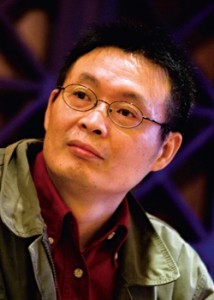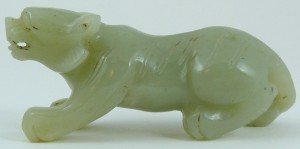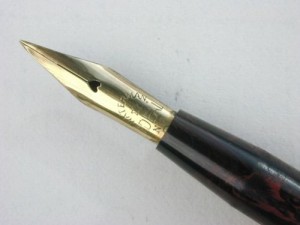“Cryptography involves one genius trying to work out what another genius has done – it results in the most appalling carnage. To succeed in this mysterious and dangerous process, you call together the finest minds at your disposal…to read the secrets hidden in a string of Arabic numerals. That sounds kind of fun, like a game; but this particular game has ruined the lives of many men and women of truly remarkable intelligence …cryptogaphy [is] the most heartbreaking profession in the world.”—transcript of interview with Director Zheng.
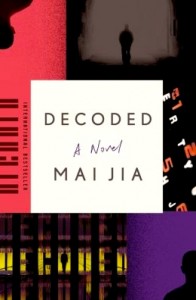 Mai Jia, a popular novelist and winner of the Mao Dun Literature Prize, China’s highest literary honor, writes here under a pen name after serving for seventeen years as a member of the People’s Liberation Army and its intelligence services. Mai’s novel Decoded, originally written and published for a Chinese audience in 2002, and newly translated and published in English, provides a fascinating study of cryptography and its dedicated cryptographers, many of whom give their lives (and even their sanity) to their work. It is also a somewhat difficult book for a western reader, in that many of the traditions of western literature and its standards regarding literary style and structure are not applicable to this novel, which was never written for western readers. Non-Chinese readers need to “go with the flow,” ignoring all preconceptions, both about China and about literature, and immerse themselves in the story, trusting in the lively translation by Olivia Milburn and Christopher Payne, which takes into consideration our unfamiliarity with modern Chinese life and culture. This careful and sensitive translation becomes both revelatory and exciting, providing new insights into worlds that have been closed to most of us, not just the hidden world of the People’s Republic of China and the thinking of many of its people, but also the world of cryptography and the psychological toll it takes on those who dedicate their lives to it.
Mai Jia, a popular novelist and winner of the Mao Dun Literature Prize, China’s highest literary honor, writes here under a pen name after serving for seventeen years as a member of the People’s Liberation Army and its intelligence services. Mai’s novel Decoded, originally written and published for a Chinese audience in 2002, and newly translated and published in English, provides a fascinating study of cryptography and its dedicated cryptographers, many of whom give their lives (and even their sanity) to their work. It is also a somewhat difficult book for a western reader, in that many of the traditions of western literature and its standards regarding literary style and structure are not applicable to this novel, which was never written for western readers. Non-Chinese readers need to “go with the flow,” ignoring all preconceptions, both about China and about literature, and immerse themselves in the story, trusting in the lively translation by Olivia Milburn and Christopher Payne, which takes into consideration our unfamiliarity with modern Chinese life and culture. This careful and sensitive translation becomes both revelatory and exciting, providing new insights into worlds that have been closed to most of us, not just the hidden world of the People’s Republic of China and the thinking of many of its people, but also the world of cryptography and the psychological toll it takes on those who dedicate their lives to it.
Astonishing in its focus on the travails and inner torments of one major character, Rong Jinzhen, the novel features a psychological, individualized approach, something I did not expect for characters living within the group culture of China, especially among characters from the army and its secret intelligence services. Though the novel cannot be considered a “psychological novel,” as we know it, the author does depict his main character, Rong Jinzhen, empathetically, as an individual within the state, giving him a real personality with which we can identify as he develops from childhood through early adulthood. An orphan who grows up within two adoptive homes, Rong Jinzhen, known in childhood as “Duckling,” is a mathematical genius, called “Idiot Savvy” in school, but he never stops feeling isolated and apart, however praised he might be for his brilliance and dedication to intellectual goals. He counts ants, the days that his “Daddy” has lived on earth before his death at age eighty-eight, invents his own multiplication tables, and becomes a chess player at the highest level of competition. No one else is close to him in his mathematical abilities, and when he goes to high school, he solves problems so quickly that, within days, the school wants to advance him by several grades.
The older and more dedicated he becomes to what he is learning, however, the more preoccupied – and pathologically withdrawn – he becomes. With his lively mind focused totally on intellectual goals, he evokes our concern as he fails to make friends or find any happiness or inner peace. When he is eventually selected to work as a cryptographer for the state, he must leave behind everything he has ever known to participate at a remote and secret location on a project which will eventually consume him – the deciphering of PURPLE, the most difficult cipher ever created. As he gets ready to leave “home,” his adoptive mother wants to give him a jade pendant of a crouching tiger from her belt for “good luck,” but his adoptive father takes it away, telling Jinzhen, “You are a genius, and you are going to make your own luck.” For his own parting gift, he takes out an old Waterman pen that he himself has used for half a century, telling him “you can use it to make note of your ideas. If you don’t let them run away from you, you will find that no one can even come close to you.”
Once Rong Jinzhen (often called Zhendi by those who remember him) disappears into Unit 701, he is essentially lost to his family. His only real acquaintance at the facility where he lives is a paranoid schizophrenic, a lunatic with whom he plays chess almost constantly, a man destroyed by his own work in cryptography. In his “spare time,” Jinzhen reads novels and becomes interested in dreams and their interpretation, and some of those in power begin to believe that because he appears not to be working on cryptography, that he is unintelligent. Then, suddenly, without warning, only a year after his arrival at Unit 701, Rong Jinzhen has a breakthrough which changes everything.
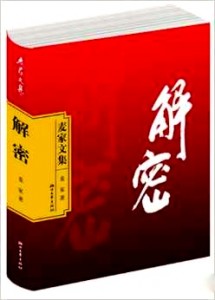
Original Chinese edition of this novel, 2002.
The remainder of the novel appears in the form of interviews with two people, Master Rong, a female member of his family whom he saved during the Cultural Revolution, and Director Zheng, the man who persuaded him to join the cryptography unit. These interviews convey Jinzhen’s history and his story, but they feature much “telling about” the action, instead of creating lively stories told from “inside the moment.” The author’s use of dreams, often disorderly, reveal Jinzhen’s state of mind, and a shift in style from narrative to Jinzhen’s internal reveries to convey his inner turmoil in the middle section of the novel show his alarming changes. Often tantalizing the reader by announcing at the end of a chapter what will happen in the next section, the author then proceeds to tell how these events came about, dampening the suspense for the reader but giving ideas of what to look for in the coming chapter. In the concluding section, the author provides some of his own thoughts about writing, his intentions with the book, and eventually the outcome for Jinzhen, creating a feeling that he wants us to be on his side and share the events with him. A literary novel, unique in its focus, setting, and subject matter, Decoded lives up to its title, providing exciting new insights into many aspects of life in the People’s Republic of China – and if a reader also happens to be a mathematician or serious games player, this novel will be utterly irresistible.
Photos, in order: The author’s photo appears on http://www.chinese-shortstories.com
The crouching tiger jade belt ornament, 18th – 19th century, worn by Jinzhen’s adoptive mother, becomes a symbol which reappears near the conclusion of the novel when Director Zheng says, “I daresay his spirit was that of a tiger. He tore apart problems as a tiger would relish gnawing meat of the bones of a recent kill…” Photo from http://www.eliteauction.com/
The Waterman pen, about 1910, given to Jinzhen by his adoptive father, is from http://oldfountainpensjustforfun.blogspot.com
